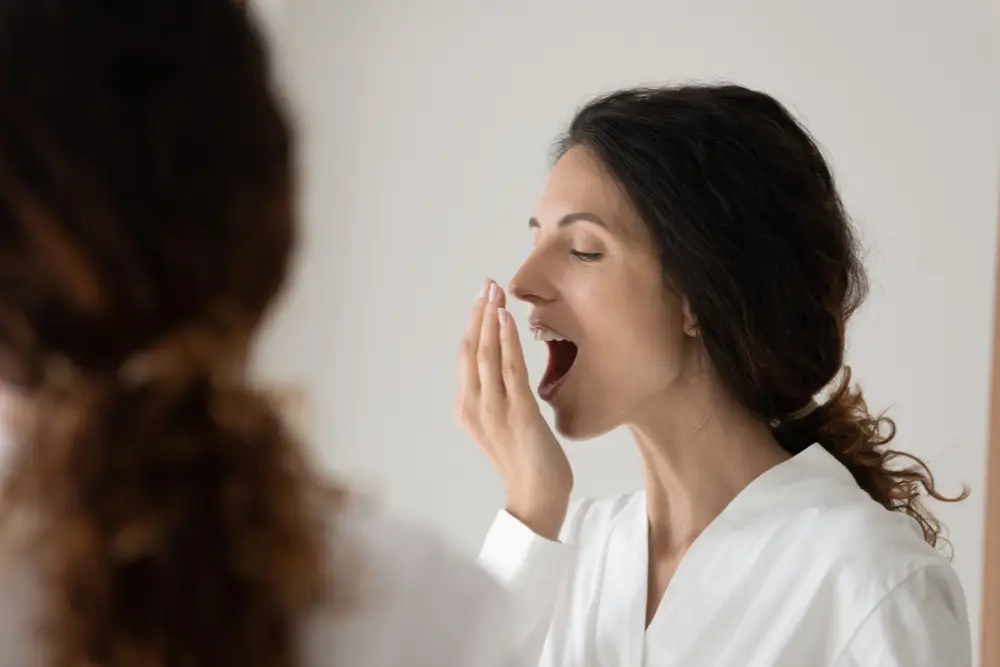Combatting Bad Breath Easily

Outline
- Combatting Bad Breath Introduction
- The prevalence of bad breath
- The social and personal impact of bad breath
- Understanding Bad Breath
- What is bad breath?
- Causes of bad breath
- Poor oral hygiene
- Dietary choices
- Medical conditions
- Identifying Bad Breath
- Self-assessment techniques
- Professional Diagnosis
- Preventative Measures
- Daily oral hygiene practices
- The importance of regular dental check-ups
- Home Remedies for Bad Breath
- Natural mouthwashes
- Dietary adjustments
- Hydration and its importance
- Oral Hygiene Products
- Choosing the right toothpaste and mouthwash
- The role of flossing and interdental brushes
- Professional Treatments
- Dental cleanings
- Specialized treatments for underlying conditions
- Diet and Bad Breath
- Foods that contribute to bad breath
- Foods that help combat bad breath
- Lifestyle Changes
- Quitting smoking
- Reducing alcohol consumption
- The Role of Hydration
- How water helps
- Recommended daily water intake
- When to See a Doctor
- Persistent bad breath
- Identifying potential underlying health issues
- Myths and Misconceptions
- Common myths about bad breath
- The truth behind these myths
- Children and Bad Breath
- Causes in children
- Prevention and treatment
- The Psychological Impact of Bad Breath
- Social anxiety and self-esteem issues
- Coping mechanisms
- Conclusion
- Recap of key points
- Encouragement to take action
- FAQs
- Can bad breath be cured permanently?
- Is bad breath always a sign of a serious problem?
- How often should I visit the dentist to prevent bad breath?
- Are there any foods that instantly freshen breath?
- What should I do if home remedies don’t work?
Combatting Bad Breath Easily
Bad breath, medically known as halitosis, is a common issue that can affect anyone. It’s more than just a minor inconvenience; it can significantly impact your social interactions and self-confidence. But don’t worry, tackling bad halitosis is easier than you might think. Let’s dive into the details and explore how you can combat halitosis effortlessly.
Understanding Bad Breath
What is Bad Breath?
Bad breath is an unpleasant odor coming from the mouth, which can result from various factors. It’s a problem that can affect your daily life, making social interactions awkward and sometimes even leading to anxiety.
Causes of Bad Breath
Poor Oral Hygiene: Not brushing and flossing regularly can leave food particles in the mouth, causing a buildup of bacteria that leads to bad breath.
Dietary Choices: Certain foods like garlic, onions, and spices can leave a lingering odor. Additionally, a diet high in sugar can promote bacterial growth.
Medical Conditions: Issues such as gum disease, dry mouth, sinus infections, and even certain systemic conditions like diabetes can contribute to bad breath.
Identifying Bad Breath
Self-Assessment Techniques
Wondering if you have bad breath? A simple method is to lick your wrist, let it dry for a few seconds, and then smell it. If it has an unpleasant odor, chances are your breath does too.
Professional Diagnosis
For a thorough assessment, visit a dentist. They can offer a more precise diagnosis and recommend suitable treatments.
Preventative Measures
Daily Oral Hygiene Practices
Brushing your teeth twice a day and flossing at least once daily are crucial steps. Don’t forget to brush your tongue, where bacteria love to hide.
The Importance of Regular Dental Check-ups
Regular visits to the dentist help in early detection and treatment of any oral health issues that could lead to bad breath.
Home Remedies for Bad Breath
Natural Mouthwashes
Rinsing with natural solutions like saltwater or a mixture of water and baking soda can help neutralize odors and kill bacteria.
Dietary Adjustments
Eating crunchy fruits and vegetables like apples and carrots can help clean your teeth and freshen your breath naturally.
Hydration and Its Importance
Staying well-hydrated keeps your mouth moist and helps remove food particles and bacteria.
Oral Hygiene Products
Choosing the Right Toothpaste and Mouthwash
Look for products that contain antibacterial ingredients and fluoride. These help in reducing plaque and maintaining oral health.
The Role of Flossing and Interdental Brushes
Flossing removes food particles and plaque from areas that a toothbrush can’t reach. Interdental brushes are also effective for cleaning between teeth.
Professional Treatments
Dental Cleanings
Regular professional cleanings remove tartar and plaque buildup that you can’t eliminate with brushing and flossing alone.
Specialized Treatments for Underlying Conditions
If bad breath is due to gum disease or another dental issue, specialized treatments like scaling and root planing or periodontal therapy might be necessary.
Diet and Bad Breath
Foods that Contribute to Bad Breath
Avoiding foods known for causing bad breath, like garlic, onions, and spicy dishes, can be helpful.
Foods that Help Combat Bad Breath
Incorporate foods like parsley, mint, and green tea into your diet, as they have natural breath-freshening properties.
Lifestyle Changes
Quitting Smoking
Smoking is a major cause of bad breath. Giving up smoking can enhance both your breath and your overall health
Reducing Alcohol Consumption
Alcohol can dehydrate your mouth, which can result in bad breath. Cutting back can help maintain a healthier oral environment.
The Role of Hydration
How Water Helps
Water helps produce saliva, which naturally cleanses the mouth and reduces bad breath.
Recommended Daily Water Intake
Aim for at least eight glasses of water a day to keep your mouth moist and fresh.
When to See a Doctor
Persistent Bad Breath
If bad breath persists despite good oral hygiene, it might be time to see a doctor to rule out any underlying health issues.
Identifying Potential Underlying Health Issues
Conditions like diabetes, liver or kidney problems, or respiratory tract infections can cause bad breath. Proper diagnosis and treatment are essential.
Myths and Misconceptions
Common Myths About Bad Breath
There are many misconceptions, such as mouthwash being a cure-all. While it helps, it’s not a substitute for good oral hygiene.
The Truth Behind These Myths
Understanding that only a combination of good practices can combat bad breath is key to effectively managing it.
Children and Bad Breath
Causes in Children
Poor oral hygiene and certain foods can cause bad breath in children. Sometimes, it could be due to something as simple as forgetting to brush their teeth.
Prevention and Treatment
Encourage good oral hygiene habits early on and ensure they visit the dentist regularly.
The Psychological Impact of Bad Breath
Social Anxiety and Self-Esteem Issues
Bad breath can lead to significant social anxiety and lower self-esteem. It’s important to address these psychological effects by treating the root cause.
Coping Mechanisms
Practice good hygiene, carry breath mints or gum, and stay hydrated to manage bad breath and boost confidence.
Conclusion
Bad breath is a manageable condition with the right approach. By understanding the causes and implementing effective solutions, you can enjoy fresh breath and improved confidence. Don’t let bad breath prevent you from living your best life.
FAQs
Can bad breath be cured permanently?
While bad breath can be managed and often eliminated with good hygiene and lifestyle changes, it’s important to maintain these practices to keep it at bay.
Is bad breath always a sign of a serious problem?
Not always. It’s often due to poor oral hygiene or dietary choices. However, persistent bad breath should be checked by a doctor.
How frequently should I visit the dentist to avoid bad breath?
A visit every six months is recommended for regular check-ups and cleanings.
Are there any foods that instantly freshen breath?
Yes, parsley, mint, and apples can help freshen your breath instantly.
What steps should I take if home remedies are ineffective?
If home remedies aren’t effective, it’s best to consult with a dentist or healthcare provider to explore other treatments.
